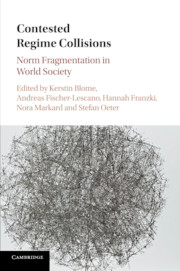Part III - Collisions otherwise
Law and the collision with non-legal spheres
Published online by Cambridge University Press: 05 May 2016
Information
- Type
- Chapter
- Information
- Contested Regime CollisionsNorm Fragmentation in World Society, pp. 253 - 371Publisher: Cambridge University PressPrint publication year: 2016
